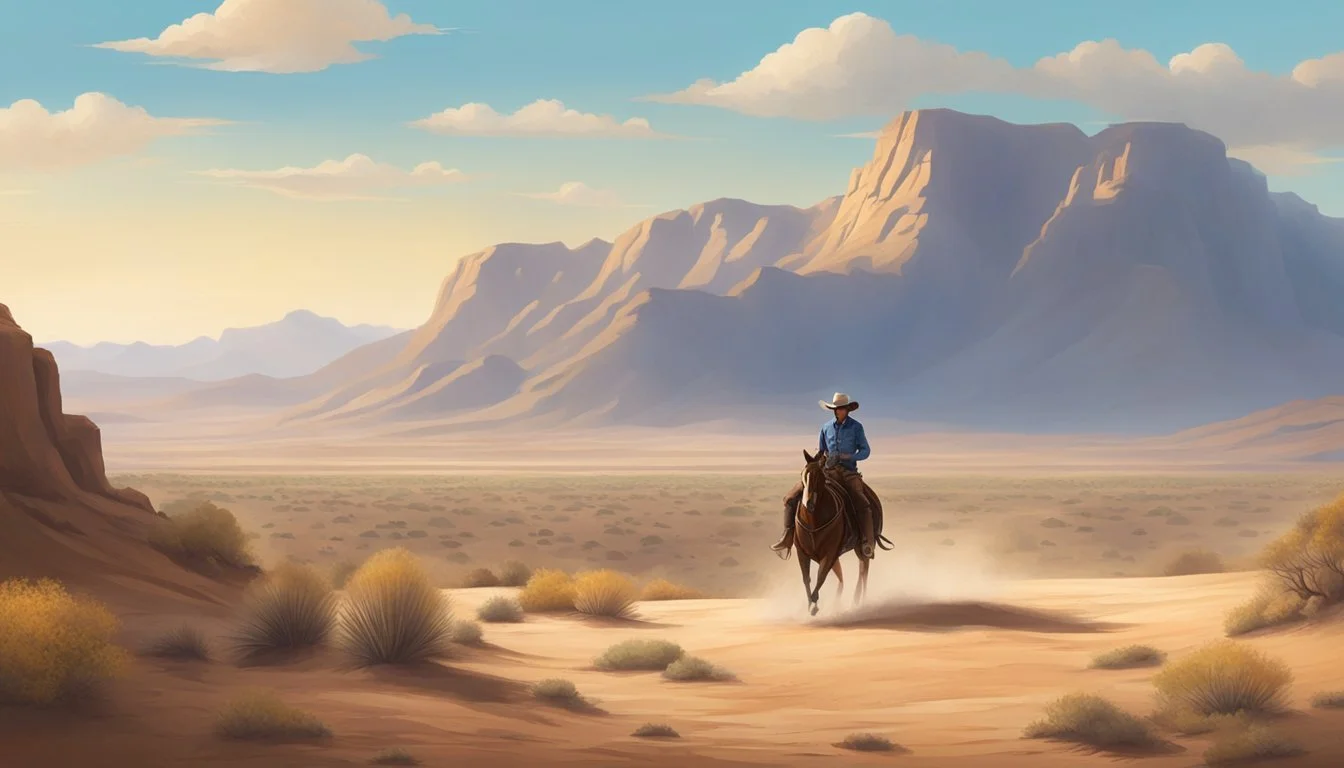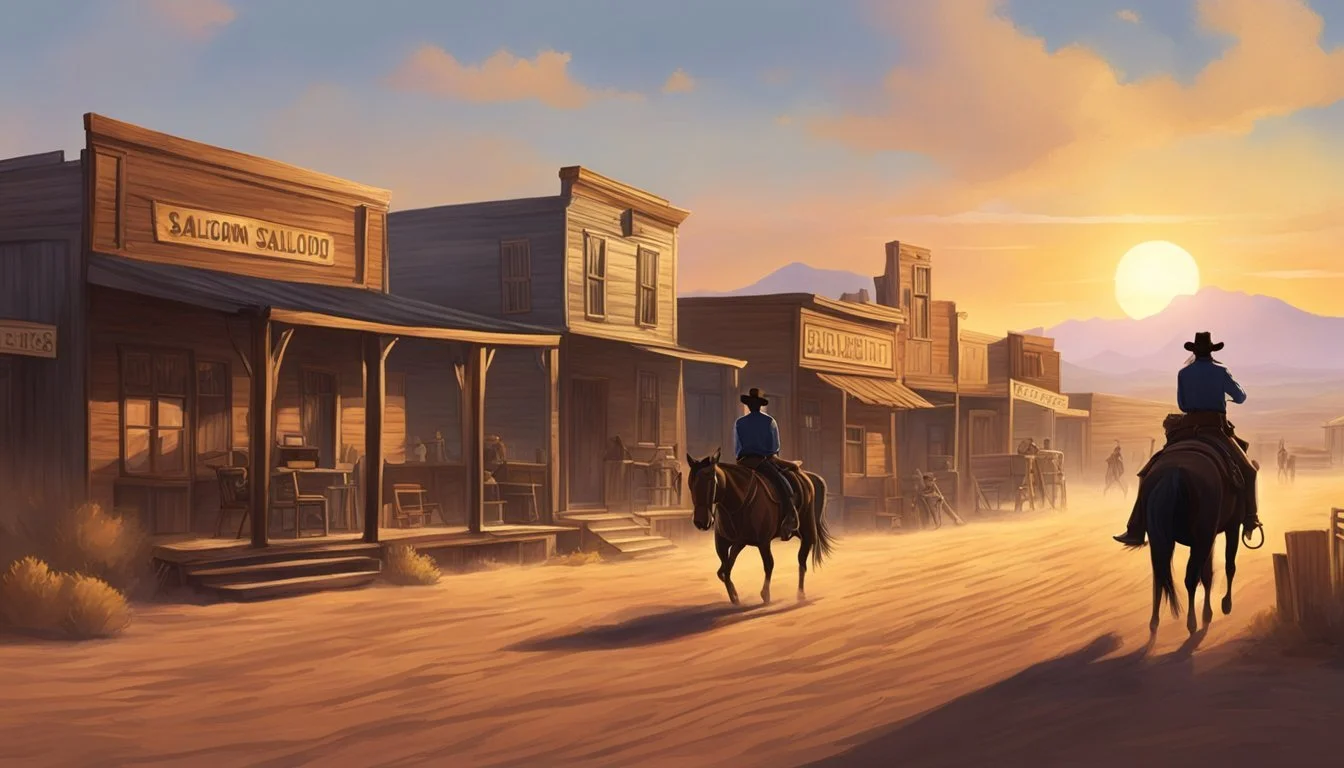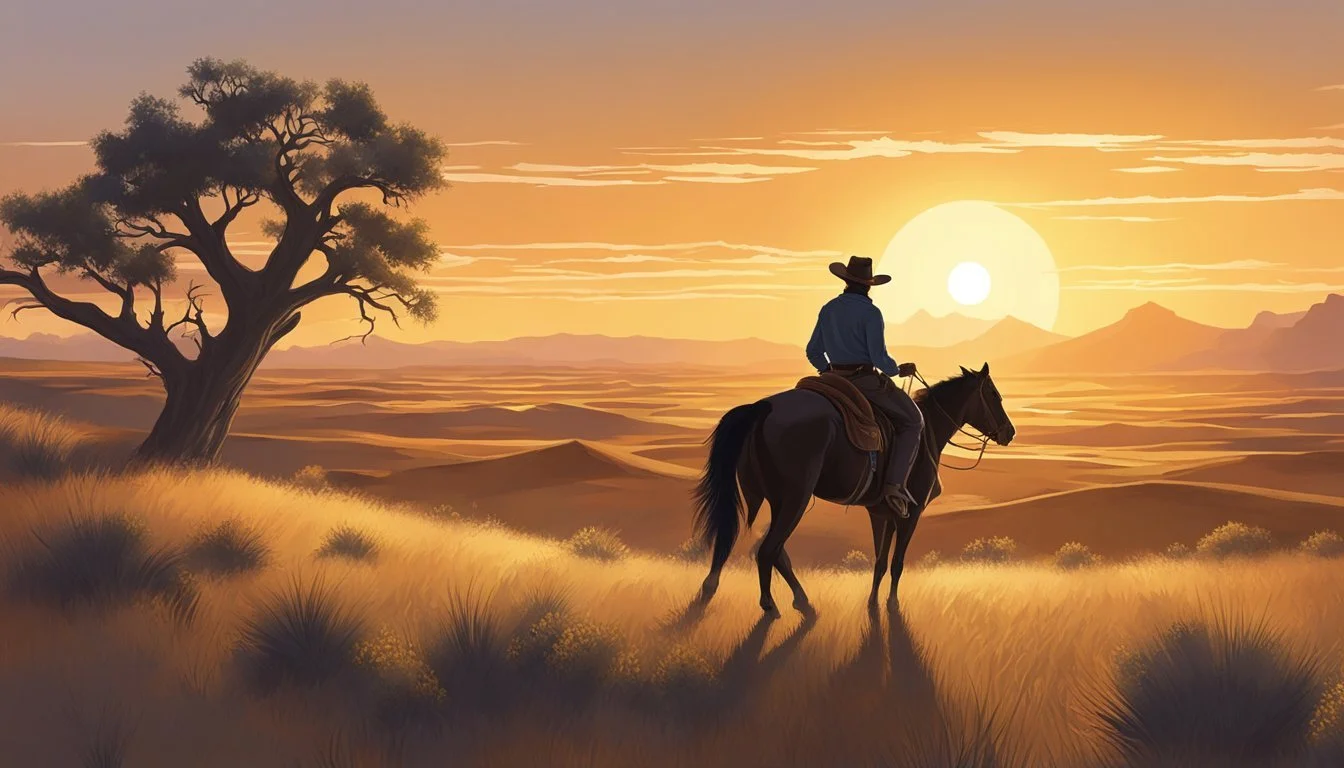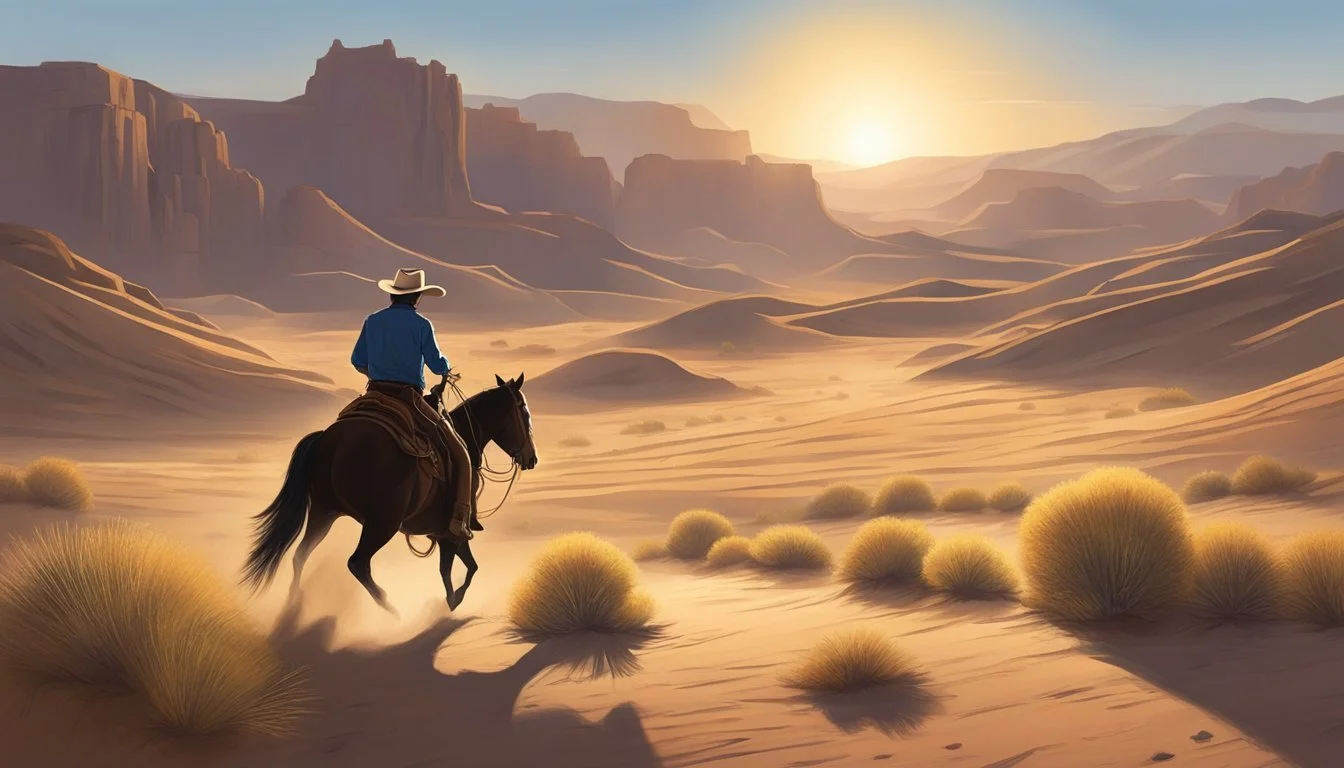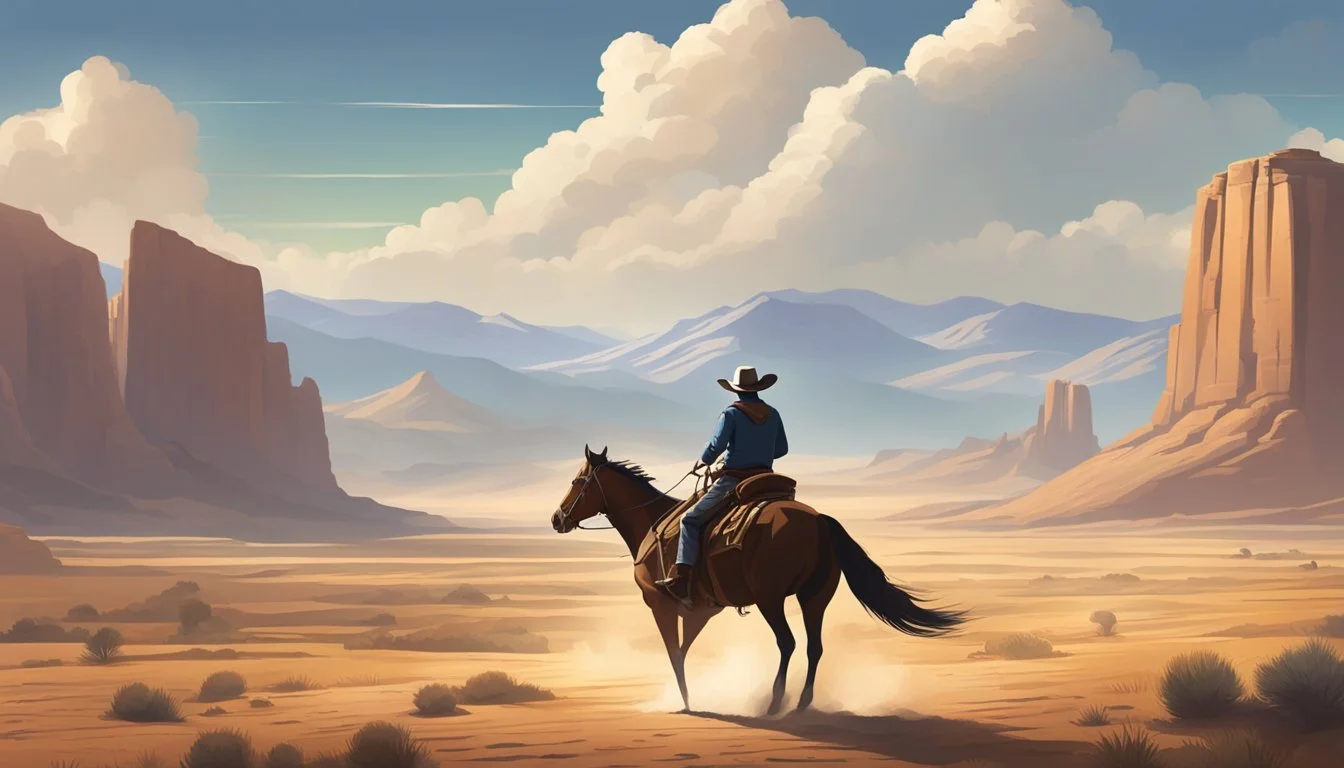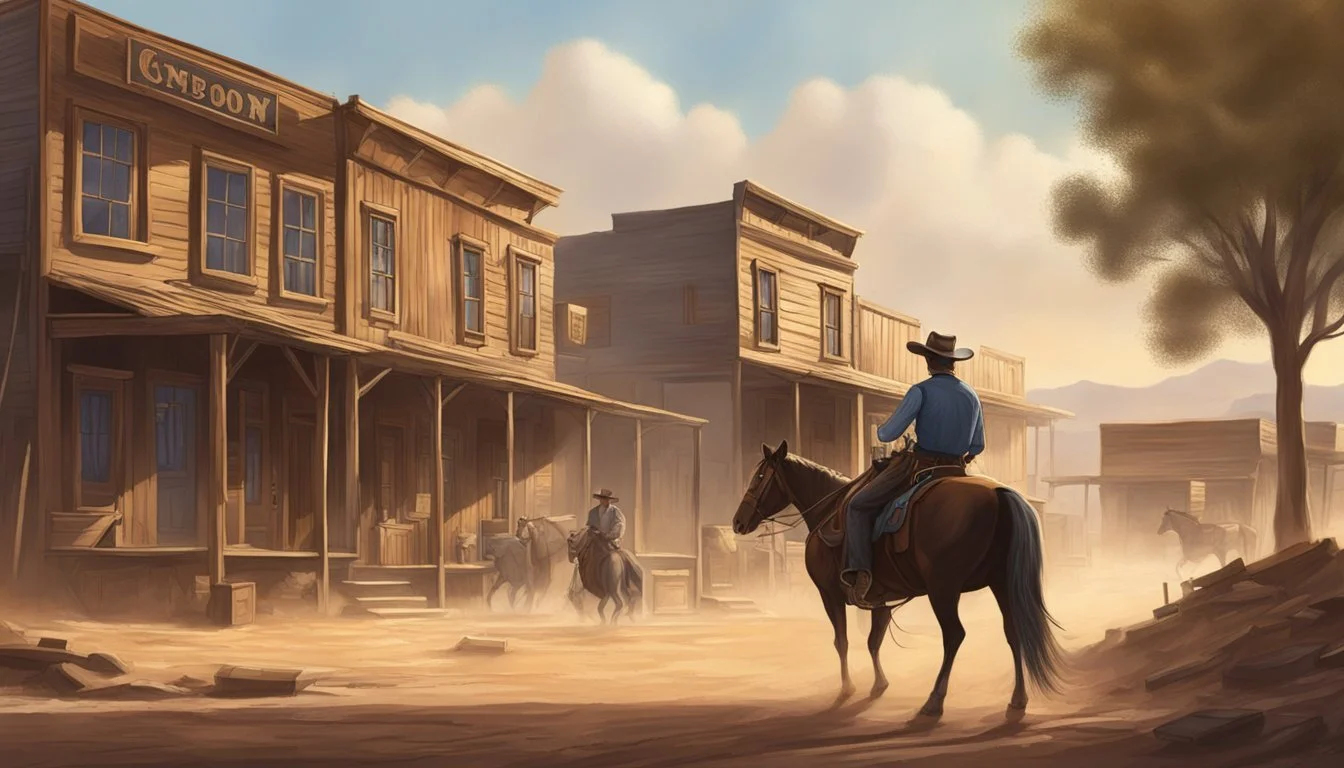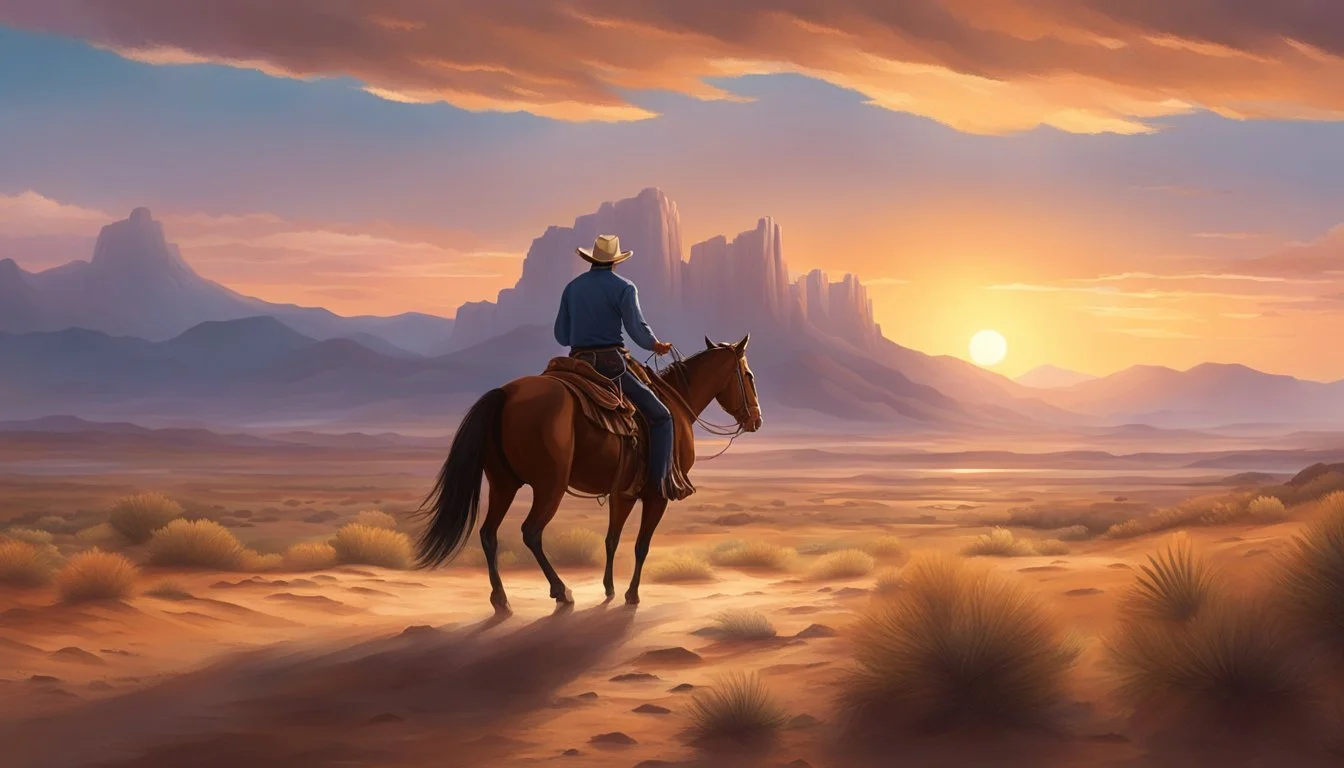The Best Cowboy-Themed Books and Novels of All Time
The Ultimate Western Reading List
The American West is an enduring symbol of rugged individualism, untamed landscapes, and the complex tapestry of stories that mythologize the frontier. It's no surprise that cowboy-themed books and novels have captured readers' imaginations for generations. These narratives often traverse the boundaries of adventure, romance, and historical fiction, providing a profound commentary on the human spirit and the societal shifts of the eras they portray.
Classic and modern western novels offer a rich exploration of themes such as survival, justice, and the struggle between wilderness and civilization. Renowned works like "Lonesome Dove" by Larry McMurtry, which won the Pulitzer Prize, have cemented their place in the literary canon through a combination of gripping storytelling and authentic representation of life on the frontier. Other titles like "True Grit" by Charles Portis provide a gritty, unromanticized view of the West, while Willa Cather's "My Ántonia" shines a light on the immigrant experience and the indomitable spirit of settlers.
These books are more than just tales of cowboys, outlaws, and settlers; they are cultural artifacts that embody the essence of an era marked by struggle, discovery, and hope. They invite readers to step into the boots of their protagonists and experience the vast landscapes of the American West, all the while delving into narratives that have shaped the Western genre and continue to resonate with audiences today.
Defining Westerns
Westerns are a genre of novels that immerse readers into the grandeur and mythos of the American West. They feature an iconic landscape that's as much a character as the cowboys, outlaws, and settlers who populate the stories. Pioneering the genre, Zane Grey's Riders of the Purple Sage is often hailed as the traditional Western novel, constructing the framework for many tales to follow.
At the heart of western literature lies the concept of the American frontier—vast, untamed, and full of possibility. This frontier backdrop presents a version of the Old West that often romanticizes the survival and bravery of individuals facing unknown dangers. Here are some key elements found in Westerns:
Setting: The physical and social conditions of the American West in the late 19th century.
Characters: Cowboys, settlers, outlaws, and Native Americans, often painted with a heroic, rugged individualism.
Plot: Central to the western story are conflicts over land, cattle drives, or territorial expansion. Themes such as justice, survival, and moral ambiguity frequently surface.
Western novels not only depict the clash of wilderness versus civilization but also explore the complex human emotions and relationships forged in such a formidable environment. Whether through the somber reflections of Edward Abbey's The Brave Cowboy or the violent epic Blood Meridian by Cormac McCarthy, the genre remains versatile, challenging preconceived notions of law, ethics, and freedom. The Western continues to captivate scholars and enthusiasts alike, as they dissect the lore and reality of the untamable landscape that is foundational to the American psyche.
Classic Western Novels
Classic Western novels capture the spirit of the American frontier, featuring rugged landscapes and compelling characters. They depict stories of hardship, lawlessness, and the indomitable human spirit. The following are some of the most revered novels in the Western genre.
Lonesome Dove
"Lonesome Dove" is a Pulitzer Prize-winning novel by Larry McMurtry. Set in the late 19th century, it explores the journey of retired Texas Rangers as they drive a cattle herd from Texas to Montana. McMurtry delivers a narrative that is both an adventure across the dangerous American frontier and a profound tale of friendship and sacrifice.
Riders of the Purple Sage
Written by Zane Grey, "Riders of the Purple Sage" is a seminal work in the Western genre. The plot centers around a woman's struggle against the persecution she faces and the gunman who becomes her protector. Set against the backdrop of the Utah-Arizona border, the novel is celebrated for its vivid descriptions and the moral complexities of its characters.
True Grit
Charles Portis's "True Grit" tells the story of a young girl's unyielding quest for justice after her father's murder. Her pursuit leads her to hire a tough U.S. Marshal and venture into Indian Territory. It's a gripping story of vengeance and courage, with a narrative voice that is sharp, witty, and resilient.
The Virginian
Owen Wister's novel "The Virginian" is often hailed as the first great Western novel and helped establish the cowboy archetype in American literature. Set in Wyoming, it portrays a stoic cowboy known only as the Virginian and his experiences on a cattle ranch. With themes of honor and the lawlessness of the West, Wister's work remains a classic portrayal of Western life and ethos.
Iconic Western Characters
The tapestry of Western literature is woven with a collection of iconic characters, from the noble cowboy to the steadfast ranger, each embodying the spirit of the Old West. These figures often represent justice, manifesting in various roles across the frontier's harsh and untamed landscapes.
The Cowboy
Cowboys have become synonymous with Westerns, often portrayed as the embodiment of rugged individualism and moral integrity. Iconic among them is Gus McCrae from Larry McMurtry’s Pulitzer Prize-winning novel Lonesome Dove. He, alongside Woodrow Call, undertakes a perilous cattle drive that is as much about adventure as it is a meditation on life and relationships.
Characteristics: Stoic, independent, skilled horseman
Symbol of: Freedom, grit, the American Frontier spirit
The Ranger
The Ranger stands as a beacon of justice, often depicted as a Texas Ranger who upholds the law in a land where chaos frequently reins. The Lone Ranger, although a fictional and somewhat mythic character, has come to epitomize the law-bringing ranger. Similarly, Zane Grey's The Lone Star Ranger portrays a Texas Ranger tasked with infiltrating an outlaw band—a classic story of redemption and the pursuit of justice.
Role: Law enforcer, symbol of order
Representation: Texas Rangers, protectors in untamed territories
The Outlaw
The Outlaw, often cast as the antagonist in Western lore, lives a life counter to societal norms, sometimes garnering unexpected sympathy or romanticism. Characters such as Billy the Kid or Jesse James have leaped from historical accounts into legend, with their lives and exploits being retold and embellished in countless novels and stories.
Duality: Charismatic anti-hero, adversary to the law
Embodies: Rebellion, the flip side of frontier justice
Evolution of the Western Genre
The Western genre has undergone significant transitions, from its inception in dime novels to its complex portrayal in recent literature, reflecting the changing American society and values.
The Changing Landscape
The early Western novels were often straightforward tales of adventure, set against the backdrop of a wild and lawless frontier. These stories were heavily influenced by the real-life events of the Civil War and the subsequent expansion into the Western territories. Zane Grey's Riders of the Purple Sage is credited with propelling the Western novel into popularity, providing a template of lone cowboys and the rugged life in the vast expanses of the American West.
In the mid-20th century, authors like Elmer Kelton, with works such as The Time It Never Rained, began to introduce elements of realism into Western novels, acknowledging the harsh environmental and sociopolitical challenges of life on the frontier. Kelton's stories often highlighted the struggle against nature and bureaucracy, a departure from the more romanticized, hero-centric tales of earlier years.
Modern Westerns
Modern Westerns have continued to evolve, often blurring the lines with other genres. For instance, No Country for Old Men by Cormac McCarthy, which was later adapted into a Western film, infuses the classic Western setting with elements of thriller and crime, reflecting contemporary issues. The genre has also seen an exploration of diverse perspectives, with authors like Annie Proulx taking the backdrop of the West to delve into stories of complex characters and relationships, as seen in works such as Brokeback Mountain.
Today's Westerns can set their stories against historical backdrops, like Winston Groom's El Paso, engaging with the tumultuous times of the Mexican Revolution, or play out in contemporary settings, addressing the lingering spirit of the Wild West in modern rural life. These stories often assess the impact of past events—like the centennial milestones of states such as Nebraska—on current identities and mythologies of the American West, illustrating the persistent allure and adaptability of the Western genre.
Notable Western Authors
The Western genre has produced many prominent authors whose works have become classics. Louis L'Amour stands as a titan in the genre, authoring over a hundred novels and numerous short stories which encapsulate the spirit of the American frontier. His well-known Haunted Mesa echoes the vastness and the solitude of the wilderness.
Zane Grey, another cornerstone of Western literature, has inspired readers with his vivid cowboy characters and panoramic descriptions of the Southwest. His novels such as "Riders of the Purple Sage" define the essence of Western fiction with themes of rugged individualism and justice.
Larry McMurtry, awarded the 1986 Pulitzer Prize for Fiction, offered a fresh take with his novel "Lonesome Dove", highlighting the trials and companionships amid the harsh landscapes. His ability to weave compelling narratives has cemented his reputation in the literary world.
Cormac McCarthy captivates with a darker representation of the West. His novel, "Blood Meridian", presents a gritty perspective that challenges romanticized conventions of the genre, instead revealing a more brutal view of American expansionism.
The contributions of Willa Cather cannot be overlooked. Her prairie novels, particularly "My Ántonia", investigate the lives of pioneers and immigrants on the American Plains, often reflecting the harsh realities and resiliency required to thrive.
Laura Ingalls Wilder, through a series of autobiographical children's books, has offered generations a window into the life of a family settling the American Midwest in the late 19th century.
Paulette Jiles and Winston Groom, although perhaps less typically associated with the Western genre, have both made notable contributions. Jiles’s "News of the World" offers a unique post-Civil War tale, while Groom’s "Forrest Gump" author explores various historical settings and captures an adventurous Southern spirit.
Western Themes and Settings
Western novels typically immerse their readers in the vivid and rugged landscapes of the American West, framing pivotal historical events and the untamed nature that characterized the era.
The American Frontier
The American Frontier is a central stage for Western literature, representing both the physical and metaphorical exploration of uncharted territories. This setting is a land of sweeping prairies, towering mountains, and expansive deserts, hosting the quintessential cowboy lifestyle. Here, characters often embody the pioneer spirit, grappling with the ethics of survival and justice amid the beauty and harshness of the Western landscape.
The Gold Rush
A defining event in the 19th century, The Gold Rush serves as an exciting backdrop for tales of ambition, greed, and the human cost of fortune. Set predominantly in California and the Klondike, these narratives dig into the transformative impact of this historical phenomenon on both individual lives and the broader social fabric. The feverish quest for precious metals sparked dramatic changes, symbolizing both hope and desperation, as settlers and prospectors flooded the West seeking their fortunes.
The Mexican Revolution
The Mexican Revolution (1910-1920) provides a complex tapestry for stories of struggle and resilience. Notably, figures like Pancho Villa emerge as folk heroes or villains, depending on the tale's perspective. These novels explore themes of rebellion, land rights, and cultural identity, with the Revolution's tumultuous events often mirroring the internal conflicts of the characters. The period is marked by its powerful influence on both Mexican and American history, shaping the geopolitical and social contours of the borderlands.
Westerns in Popular Culture
Westerns have long transcended the realm of literature, becoming a defining genre in both film and television. Their themes of rugged individualism, frontier justice, and the struggle between wilderness and civilization resonate with audiences even today.
Western Influence in Movies
The Western genre has a storied history in cinema, with John Wayne standing as a towering figure. Wayne's films, such as Stagecoach (1939) and The Searchers (1956), have cemented his status as the iconic cowboy. Movies like Butch Cassidy and the Sundance Kid (1969) have left an indelible mark, portraying outlaws with a mix of charm and menace. More recently, The Assassination of Jesse James by the Coward Robert Ford (2007) offers a grittier, more nuanced portrayal. The film features complex character studies against the backdrop of the expanding American West.
Westerns and Television
Television further popularized Western narratives, often focusing on tales of lawmen and outlaws. Series from the mid-20th century such as Gunsmoke and Bonanza are prime examples, shaping the public's perception of the Wild West. These shows depicted the tension and drama of pioneers carving a life in the face of adversity and moral ambiguity.
Crossovers and Genre Blending
In the evolving landscape of literature, certain books have made distinctive marks by melding the Western genre with other literary styles. This fusion of genres brings readers into worlds where the traditional elements of the Old West are layered with fantastical or dramatic nuances, providing fresh and engaging narratives.
Western Fantasy and Science Fiction
Stephen King's "The Dark Tower" series stands as a quintessential model of Western fantasy crossover. It intricately weaves the archetypal cowboy figure into a complex narrative that fuses fantasy elements with the landscape of a science fiction multiverse. This series has not only redefined the boundaries of genre crossover but has also become a hallmark of King's storytelling prowess.
Notable Work:
The Dark Tower | Stephen King
Western Drama
Shifting to the domain of Western drama, authors like Cormac McCarthy and Annie Proulx have contributed profoundly. McCarthy's "No Country for Old Men" provides a raw and gritty picture of the West with the pace and gravity of the finest dramas, offering readers a Western experience immersed in psychological complexity and stark realism.
Distinguished Examples:
No Country for Old Men | Cormac McCarthy
Short stories by Annie Proulx
The blending of genres within these works underscores the versatility and enduring appeal of Western themes when combined thoughtfully with elements of drama, fantasy, or science fiction.
Awards and Recognition in Western Literature
Western literature has a storied tradition of prestigious awards celebrating excellence in the genre. Among these, the Pulitzer Prize stands as a significant accolade. "Lonesome Dove" by Larry McMurtry, for instance, notably won the Pulitzer Prize for Fiction in 1986, cementing its status as a western classic.
The Spur Awards, established by the Western Writers of America (WWA) in 1953, is another esteemed recognition in the field of western books. It is specifically tailored to honor writers for outstanding writing about the American West. The Spur Awards include categories such as:
Best Western Historical Novel
Best Western Traditional Novel
Best Western Contemporary Novel
...and several others.
Western novels that receive these commendations often explore the vast frontiers and complex histories that characterize the genre. The Spur Awards are seen as one of the most prestigious awards in American literature, held in high regards by writers and readers alike.
As the interest in western themes continues, both classic and modern western books are frequently acknowledged by these awards. Such recognition reflects the enduring appeal of stories set in the rich tapestry of the American West, where narratives of adventure, law, and morality play out against a backdrop of rugged landscapes.
These awards contribute significantly to the standing of western literature, guiding readers to acclaimed works within an extensive and varied genre.
Cultural Significance and Impact
Cowboy-themed books and novels have played a significant role in shaping the perception of American history. These narratives often reflect upon the Civil War era, illustrating the after-effects on American society, and delve part of their roots from buffalo hunting expeditions and cattle drives, activities central to the development of the American West.
The Old West is frequently portrayed as a lawless frontier where toughness and resilience were vital for survival. Classics like Old Yeller capture the essence of such rugged experiences, underscoring the bond between humans and animals against a backdrop of challenges.
The portrayal of the Old West isn’t just limited to romanticized tales of cowboys and gunslingers. Works like Dee Brown's Bury My Heart at Wounded Knee, present the harsh realities and consequences of American expansionism for Native Americans. This novel stands out for contributing to an understanding of the Old West from a perspective that highlights the impact of these historical events on indigenous populations.
Key Themes in Cowboy-Themed Literature:
American History:
Civil War aftermath
Frontier life and expansion
Social Dynamics:
Lawlessness and order
Community building
Environmental Interaction:
Buffalo hunting
Cattle drives
The cultural impact of these books is further magnified by their ability to distill complex themes into accessible stories. They encourage readers to reflect on the resilience required to thrive amidst adversity. Cowboy-themed literature serves as an entry point into an era that has fascinated readers, blending adventure with cultural instruction, and illuminating the many facets of the Old West.
Additional Influential Works
This section sheds light on seminal cowboy-themed literature, branching into the realms of children's literature and non-fiction. These works have contributed significantly to the Western genre, each offering unique perspectives and historical insights.
Children's Literature
Laura Ingalls Wilder is a prominent figure in children's Western-themed literature. Her series, which includes the renowned Little House on the Prairie, provides a vivid depiction of pioneer life through the eyes of a young girl. Wilder’s tales of homesteaders navigating the challenges and triumphs of frontier life have become classics, cherished by generations.
Will James, another notable author, captured the cowboy spirit in books such as Smoky the Cowhorse. His authentic storytelling, drawn from personal experience, has been instrumental in shaping the cowboy image for the young readers.
Western Non-Fiction
In the domain of non-fiction, Frank Dobie is an authoritative voice. His extensive works delve into the myths and realities of the Old West, focusing on everything from mustangs to the grandeur of open ranges.
Edward Abbey is best-known for his environmental advocacy, but works like Desert Solitaire showcase a deep connection to and reflection on Western landscapes. Abbey's writings bring an anarchistic and ecological perspective to the discussion of the West.
Willa Cather's My Ántonia, although a work of fiction, offers a narrative deeply rooted in the author's own experiences with homesteaders. It paints a profound and detailed portrait of life on the Nebraskan prairies during the 19th century, making it an essential inclusion for its historical and cultural value.
Conclusion
When exploring the rich tapestry of cowboy-themed literature, readers find themselves transported across the rugged landscapes of the American West. The Art of Manliness endorses Edward Abbey's The Brave Cowboy for its legendary status in Western writing. The Western Writers of America recognizes classics including The Virginian by Owen Wister and The Ox-Bow Incident by Walter van Tilburg Clark, placing them among the all-time must-reads.
The value of these narratives lies in their ability to encapsulate the era's spirit—sometimes through historical events, as with Blood Meridian, or through a blend of humor and heartfelt storytelling, found in the works of Ben Green. True Grit highlights a young girl's quest for justice, providing a compelling take on themes of vengeance and determination.
Notable Authors and Books:
Edward Abbey: The Brave Cowboy
Owen Wister: The Virginian
Walter van Tilburg Clark: The Ox-Bow Incident
Cormac McCarthy: Blood Meridian
Charles Portis: True Grit
These books serve as touchstones within the genre, offering diverse perspectives on a transformative period in American history. They provide an entry point for those looking to understand the complexities and adventures that the Wild West embodies. Through these stories, the myth of the cowboy lives on, resonating with readers who appreciate the genre's enduring legacy.

